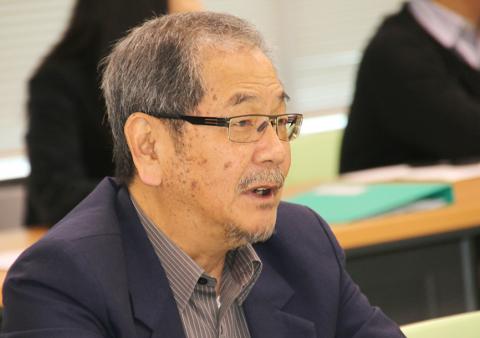Former Democratic Progressive Party (DPP) secretary-general Wu Nai-jen (吳乃仁) yesterday said that he would quit the party — as well as a clique of former New Tide faction members, of which he is an influential member — to protest the nomination of Executive Yuan Secretary-General Cho Jung-tai (卓榮泰) for party chairperson.
Wu made the remarks in an instant messaging group used by the clique.
He singled out Taoyuan Mayor Cheng Wen-tsan (鄭文燦), a member of the group, as the source of his frustration, saying that Cheng’s endorsement of Cho after Cho last month lashed out at DPP Legislator Tuan Yi-kang (段宜康), another member of the clique, showed that Cheng did not value his 30 years of friendship with Tuan.

Photo: Liu Hsin-de, Taipei Times
The move would negatively affect Tuan’s role as one of the group’s leading figures, Wu added.
Tuan last month sparked a dispute with Cho after he slammed his palm on the podium during a question-and-answer session at the Legislative Yuan when grilling Premier William Lai (賴清德) over DPP policies that had drawn public criticism, which he said led to the party’s losses in the Nov. 24 nine-in-one elections.
Cho called Tuan’s harsh criticism of the party “completely unacceptable” and asked whether the DPP had been wrong to push pension reforms for retired civil servants, military personnel and public-school teachers.
Legislation to eliminate a much-criticized 18 percent preferential interest rate for the retirees in six years was led by Tuan, Cho said.
The party “took a wrong step” while reflecting after its election losses, as did President Tsai Ing-wen (蔡英文) when she met with Taipei Mayor Ko Wen-je (柯文哲) on Thursday, Wu said.
He added that while those errors cause him pain, his endorsement of Cho was the last straw.
“The New Tide faction is a failed project. It cannot speak its mind, even when the party is going through a crisis, which proves that it no longer has a reason to exist,” Wu said.
The DPP in 2006 dissolved its factions, but many continue to exist unofficially.
Asked for comment while accompanying Cho to register for the DPP chairperson election, Cheng said: “I have not learned of that situation.”
Cho said that Wu is an “amiable and experienced” DPP member who he hopes would remain in the party.
Additional reporting by Sean Lin and CNA

DAREDEVIL: Honnold said it had always been a dream of his to climb Taipei 101, while a Netflix producer said the skyscraper was ‘a real icon of this country’ US climber Alex Honnold yesterday took on Taiwan’s tallest building, becoming the first person to scale Taipei 101 without a rope, harness or safety net. Hundreds of spectators gathered at the base of the 101-story skyscraper to watch Honnold, 40, embark on his daredevil feat, which was also broadcast live on Netflix. Dressed in a red T-shirt and yellow custom-made climbing shoes, Honnold swiftly moved up the southeast face of the glass and steel building. At one point, he stepped onto a platform midway up to wave down at fans and onlookers who were taking photos. People watching from inside

A Vietnamese migrant worker yesterday won NT$12 million (US$379,627) on a Lunar New Year scratch card in Kaohsiung as part of Taiwan Lottery Co’s (台灣彩券) “NT$12 Million Grand Fortune” (1200萬大吉利) game. The man was the first top-prize winner of the new game launched on Jan. 6 to mark the Lunar New Year. Three Vietnamese migrant workers visited a Taiwan Lottery shop on Xinyue Street in Kaohsiung’s Gangshan District (崗山), a store representative said. The player bought multiple tickets and, after winning nothing, held the final lottery ticket in one hand and rubbed the store’s statue of the Maitreya Buddha’s belly with the other,

‘NATO-PLUS’: ‘Our strategic partners in the Indo-Pacific are facing increasing aggression by the Chinese Communist Party,’ US Representative Rob Wittman said The US House of Representatives on Monday released its version of the Consolidated Appropriations Act, which includes US$1.15 billion to support security cooperation with Taiwan. The omnibus act, covering US$1.2 trillion of spending, allocates US$1 billion for the Taiwan Security Cooperation Initiative, as well as US$150 million for the replacement of defense articles and reimbursement of defense services provided to Taiwan. The fund allocations were based on the US National Defense Authorization Act for fiscal 2026 that was passed by the US Congress last month and authorized up to US$1 billion to the US Defense Security Cooperation Agency in support of the

HIGH-TECH DEAL: Chipmakers that expand in the US would be able to import up to 2.5 times their new capacity with no extra tariffs during an approved construction period Taiwan aims to build a “democratic” high-tech supply chain with the US and form a strategic artificial intelligence (AI) partnership under the new tariffs deal it sealed with Washington last week, Taipei’s top negotiator in the talks said yesterday. US President Donald Trump has pushed Taiwan, a major producer of semiconductors which runs a large trade surplus with the US, to invest more in the US, specifically in chips that power AI. Under the terms of the long-negotiated deal, chipmakers such as Taiwan Semiconductor Manufacturing Co (TSMC, 台積電) that expand US production would incur a lower tariff on semiconductors or related manufacturing